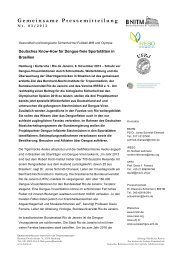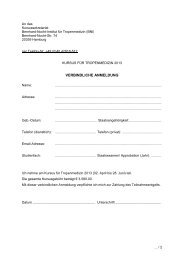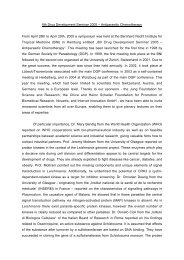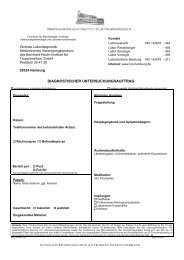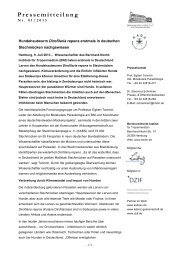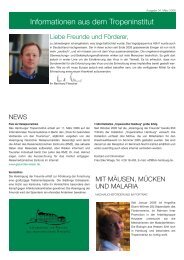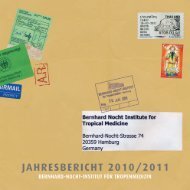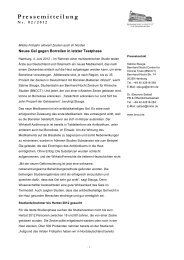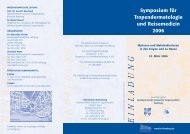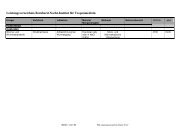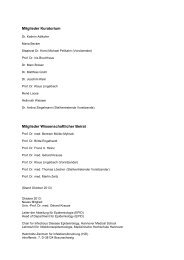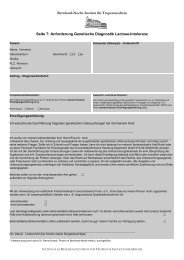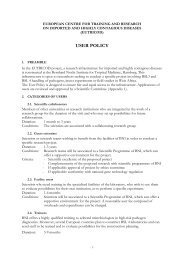ChRonIK - Bernhard-Nocht-Institut für Tropenmedizin
ChRonIK - Bernhard-Nocht-Institut für Tropenmedizin
ChRonIK - Bernhard-Nocht-Institut für Tropenmedizin
Sie wollen auch ein ePaper? Erhöhen Sie die Reichweite Ihrer Titel.
YUMPU macht aus Druck-PDFs automatisch weboptimierte ePaper, die Google liebt.
Fachbereich Biologie WS SS<br />
Molekulare Parasitologie; Vorlesung 2 st., 3 LP<br />
Iris Bruchhaus, Volker Heussler, Tim-Wolf Gilberger, Hannelore Lotter<br />
Molekulare Parasitologie; Praktikum 6 st., 6 LP<br />
Iris Bruchhaus, Volker Heussler, Tim-Wolf Gilberger, Hannelore Lotter<br />
Molekularbiologische und proteinbiochemische Analysen am humanen Malariaerreger Plasmodium falciparum; Blockpraktikum,<br />
Blockraktikum., 6 st., 6 LP<br />
Carsten Wrenger, Ingrid B. Müller, Rolf D. Walter<br />
Vitamin B6 Biosynthese bei Plasmodium falciparum: Molekularbiologische Analysen des Enzymkomplexes; Blockpraktikum, 6 st., 6 LP<br />
Carsten Wrenger, Ingrid B. Müller, Rolf D. Walter<br />
Virologisches Praktikum <strong>für</strong> Biochemiker; Blockpraktikum, 2 Wochen<br />
Stephan Günther und MitarbeiterInnen<br />
Tropische Viren: Klinik, Diagnostik, Pathogenese und Molekularbiologie; Vorlesung, 2 st.<br />
Stephan Günther und MitarbeiterInnen<br />
Zelluläre und Molekulare Immunologie; Vorlesung, 2 st.<br />
<strong>Bernhard</strong> Fleischer und MitarbeiterInnen<br />
Aktuelle Probleme der Immunologie; Seminar, 1 st.<br />
<strong>Bernhard</strong> Fleischer und MitarbeiterInnen<br />
Immunologisches Literaturseminar; 1 st.<br />
<strong>Bernhard</strong> Fleischer und MitarbeiterInnen<br />
Fachbereich Chemie WS SS<br />
Fünftägiges virologisches Praktikum <strong>für</strong> Biochemiker; nach Veinbarung<br />
Stephan Günther und MitarbeiterInnen<br />
Tropische Viren: Klinik, Diagnostik, Pathogenese und Molekularbiologie; Vorlesung, 2 st.<br />
Stephan Günther und MitarbeiterInnen<br />
Biochemische Analytik; Vorlesung, 2 st.<br />
Joachim Clos und andere Dozenten der Biochemie<br />
*Wahlfach Tropen- und Reisemedizin<br />
<strong>für</strong> Studierende der Medizin der Universität Hamburg<br />
Tutoren<br />
Prof. Dr. Gerd-Dieter Burchard<br />
(Tutor <strong>für</strong> klinische <strong>Tropenmedizin</strong>)<br />
Prof. Dr. Egbert Tannich<br />
(Tutor <strong>für</strong> theoretische <strong>Tropenmedizin</strong>)<br />
110<br />
Wahlfach Tropen- und Reisemedizin<br />
Studenten, die ein besonderes Interesse an der<br />
Tropen- und Reisemedizin zeigen, sollen durch<br />
Angebot des Wahlfaches die Möglichkeit erhalten,<br />
einen Schwerpunkt in ihrer Ausbildung zu setzen.<br />
Deshalb wird dieses Wahlfach seit einigen Jahren in<br />
Zusammenarbeit mit dem UKE <strong>für</strong> maximal sechs<br />
ausgewählte Medizinstudenten/innen angeboten.<br />
Das Fach Tropen- und Reisemedizin eignet sich ganz<br />
besonders <strong>für</strong> einen fächerübergreifenden Unterricht,<br />
– da es sich nicht auf ein Organ bezieht, sondern weil<br />
Tropenkrankheiten alle Organsysteme betreffen<br />
können<br />
– da <strong>Tropenmedizin</strong> ein typisches Querschnittsfach<br />
ist, das neben der internistischen Ausbildung auch<br />
theoretische, diagnostische, mikrobiologische und<br />
chirurgische Aspekte beinhaltet<br />
– da nicht nur Aspekte der kurativen Medizin sondern<br />
auch des Öffentlichen Gesundheitswesens vermittelt<br />
werden können.<br />
Der Kurs dauert 12 Wochen und findet zweimal<br />
jährlich ab Oktober bzw. Januar statt.<br />
Bekanntgabe und Anmeldung auf den Seiten der<br />
Medizinischen Fakultät unter<br />
www.uke.uni-hamburg.de/studierende<br />
x<br />
x<br />
x<br />
x<br />
x<br />
x<br />
x<br />
x<br />
x<br />
x<br />
x<br />
x<br />
sEMInaRE<br />
Prof. Dr. Thomas Pomorski<br />
<strong>Institut</strong> <strong>für</strong> Biologie/Biophysik, Humboldt-Universität, Berlin<br />
„Lipid transport and drug resistance in Leishmania“ (14.01.2008)<br />
Dr. Sergey Nejentsev, MD, PhD<br />
Cambridge <strong>Institut</strong>e of Medical Research, University of Cambridge<br />
“Genetics of type 1 diabetes” (15.01.2008)<br />
Dr. Norbert Schwarz<br />
<strong>Institut</strong> de Veille Sanitaire, Paris<br />
„Placental malaria is associated with a higher malaria risk in the first<br />
30 months of life“ (18.01.2008)<br />
Dr. Sven Mostböck<br />
Universität Regensburg, Dep. of Immunology<br />
„Costimulation leads to reduced memory CD8 T cell functionality“<br />
(12.02.2008)<br />
Dr. Marek Cyrklaff<br />
Max-Planck-<strong>Institut</strong> <strong>für</strong> Biochemie, Martinsried<br />
„Cyro-electron tomography of whole cell: the pathogens in 3D“<br />
(19.02.2008)<br />
Dr. Michael Walther<br />
MRC Laboratories, Atlantic Boulevard, Fajara, The Gambia<br />
“What causes Severe Malaria? - on the potential role of T-regulatory<br />
cells and parasite invasion phenotypes – “ (25.02.2008)<br />
Dr. Friedrich Frischknecht<br />
Universität Heidelberg, Abt. Parasitologie<br />
„Imaging movement of malaria parasites“ (03.03.2008)<br />
Dr. Harald Ittrich<br />
Molecular Imaging Center (MIC) & Diagnostikzentrum Universitätsklinikum<br />
Hamburg-Eppendorf<br />
„Möglichkeiten der nichtinvasiven Kleintierbildgebung mittels MRT“<br />
(08.04.2008)<br />
Prof. John Hyde<br />
University of Manchester, UK<br />
“Folate biosynthesis in malaria-parasites – rewriting the textbooks”<br />
(15.04.2008)<br />
Prof. Peter Preiser<br />
Nanyang Technological University, Singapore<br />
“New insights into red blood cell invasion by malaria merozoites”<br />
(17.04.2008)<br />
Major Jonathan opai-Tetteh<br />
z.Zt. Führungsakademie der Bundeswehr, Hamburg<br />
„Ghana: Geschichte, kultureller und sozioökonomischer Hintergrund<br />
sowie deutsch-ghanaische Beziehungen“ (08.05.2008)<br />
Prof. Adrian V.S. Hill<br />
The Jenner <strong>Institut</strong>e, Oxford, UK<br />
“Tropical infectious diseases: some genes and some vaccines”<br />
(26.05.2008)<br />
Dr. Cordula Stover<br />
University of Leicester<br />
Dep. of Infection, Immunity and Inflammation<br />
“Properdin: New discovery on role of vital protein that fights meningitis”<br />
(27.05.2008)<br />
Dr. Kerrin Small<br />
Wellcome Trust Centre for Human Genetics, University of Oxford, UK<br />
„Genome-wide association study of severe malaria” (29.05.2008)<br />
Prof. osamu Kaneko<br />
<strong>Institut</strong>e of Tropical Medicine, Nagasaki University, JAPAN<br />
„The hidden weapons of the malaria parasite: Rhoptries and their<br />
protein complexes“ (09.06.2008)<br />
Prof. Brendan Crabb<br />
Burnet <strong>Institut</strong>e, Melbourne<br />
„Early events mediating invasion into erythrocytes by the malaria<br />
parasite“ 17.06.2008)<br />
PD Dr. Susanne Hartmann<br />
Humboldt Universität Berlin, Molecular Parasitology<br />
„Immunomodulation by parasitic nematodes: novel strategies to<br />
interfere with allergic inflammation“ (24.06.2008)<br />
PD Dr. Ralf Ignatius<br />
Charité Berlin<br />
„Exploiting dendritic cell biology to define new adjuvants for the<br />
development of HIV-vaccines“ (01.07.2008)<br />
Dr. Nicole Fischer<br />
<strong>Institut</strong> <strong>für</strong> Med. Mikrobiologie, Virologie und Hygiene, UKE<br />
„Virus Detection and Discovery using DNA Microarrays” (07.07.2008)<br />
Prof. Dr. Gisa Tiegs<br />
<strong>Institut</strong> <strong>für</strong> Experimentelle Immunologie und Hepatologie, UKE<br />
“Immune-mediated liver injury: Pathophysiology and Tolerance<br />
Induction” (08.07.2008)<br />
Prof. John D. Fraser<br />
School of Medical Sciences, Maurice Wilkins Centre for Molecular Biodiscovery,<br />
University of Auckland<br />
“Understanding staphylococcal virulence” (10.07.2008)<br />
Dr. Fabian Leendertz<br />
Robert Koch-<strong>Institut</strong><br />
„Erreger, die aus dem Urwald kommen“ (22.07.2008)<br />
Dr. John Bosco Rwakimari<br />
Uganda National Malaria Control Programme, Ministry of Health<br />
“DDT use to fight malaria and its effects on agriculture” (30.09.2008)<br />
Joanne Heng<br />
University of Melbourne<br />
“Investigations into hexosamine-dependent virulence factors in<br />
Leishmania” (02.10.2008)<br />
Prof. Dr. Christian Maercker<br />
University of Applied Sciences Mannheim<br />
“Monitoring of cell adhesion by electric cell-substrate impedance<br />
sensing (ECIS)” (15.10.2008)<br />
Prof. Dr. Tim Sparwasser<br />
TwincoreMHH/HZI<br />
“Novel approaches for vaccine design: Bypassing Treg activity enhances<br />
T cell-mediated immunity” (28.10.2008)<br />
Dr. Kathleen E. Rankin<br />
Dept. of Physiology and Biophysics, University of Washington, Seattle, USA<br />
„Microtubule stability and the cell cortex: The role of MCAK in<br />
microtubule-cortex interactions” (20.11.2008)<br />
Dr. Samuel Blay Nguah<br />
Komfo Anokye Teaching Hospital, Dept. of Child Health, Kumasi, Ghana<br />
“Acid-base status and serum electrolytes in children with severe<br />
malaria at KATH” (04.12.2008)<br />
Gerald Spaeth<br />
Department of Parasitology, Pasteur <strong>Institut</strong>e, Paris<br />
“From Sensing to Virulence: Deconstructing Leishmania signalling<br />
during the infectious cycle using phosphor-proteomic approaches”<br />
(09.12.2008)<br />
Dr. Marcel Deponte<br />
Ludwig-Maximilian-Universität, München<br />
“New lessons on glutathione-dependent catalysis and evolution of the<br />
mitochondrial protein transport machinery” (13.01.2009)<br />
Prof. Dr. Henning Ulrich<br />
University of Sao Paulo<br />
“Invasion ligands and inhibitors for the study of the mechanism of cell<br />
infection by Trypanosoma cruzi” (03.03.2009)<br />
Dr. Clarissa Da Costa<br />
<strong>Institut</strong>e for Medical Microbiology, Immunology and Hygiene, Technical<br />
University of Munich<br />
„Linking innate and adaptive immune responses during schistosomiasis:<br />
Treg, TLR2 and the role of commensal bacteria“ (10.03.2009)<br />
Dr. Sven B. Gould<br />
University of Melbourne, School of Botany, Australia<br />
“Learning from one another:The cytoskeleton of Alveolates”<br />
(28.04.2009)<br />
Dr. Monica Hagedorn<br />
Dép. de Biochemie, Faculté des Sciences, Université de Genève, Suisse<br />
“Dictyostelium, a new model to study mycobacteria virulence and host<br />
defense mechanisms” (08.05.2009)<br />
Prof. Vivek Malhotra<br />
Center for Genomic Regulation – Barcelona<br />
“Pathways of conventional and unconventional protein secretion”<br />
(12.05.2009)<br />
Dr. Adam Grundhoff<br />
Heinrich-Pette-<strong>Institut</strong>, Hamburg<br />
„Virus-encoded microRNAs“ (02.06.2009)<br />
Prof. Dr. Klaus Lingelbach<br />
Philipps-Universität, FB Biologie, Marburg<br />
„Protein trafficking in Plasmodium falciparum-infected red blood cells<br />
and downstream effects“ (09.06.2009)<br />
Dr. Steffen Borrmann<br />
Heidelberg University School of Medicine, <strong>Institut</strong>e of Hygiene<br />
Kenya Medical Research Programme/Wellcome Trust, Kilifi, Kenya<br />
“Evolution of drug-resistant Plasmodium falciparum in Kilifi, Kenya”<br />
(23.06.2009)<br />
Michael Reese, Ph.D.<br />
Stanford University, USA<br />
“Virulence without catalysis: Probing the role of Toxoplasma secreted<br />
pseudokinases in pathogenesis” (24.06.2009)<br />
Prof. D. Soldati-Favre<br />
University of Geneva, Switzerland<br />
“The glido some: an engine powering motility and host cell invasion by<br />
the Apicomplexa” (30.06.2009)<br />
Prof. Francesco Ria<br />
<strong>Institut</strong>e of General Pathology, Catholic University, Rome, Italy<br />
„How host and pathogen determine the outcome of immune responses<br />
at the individual T cell level.“ (07.07.2009)<br />
Dr. Andreas Hutloff<br />
Robert-Koch-<strong>Institut</strong> und Deutsches Rheuma-Forschungszentrum, Berlin<br />
“The Role of ICOS in T/B-Cell-Cooperation in vivo” (31.08.2009)<br />
Prof. Brian K. Coombes<br />
McMaster University, Canada<br />
“Regulatory evolution in an intracellular bacteria and its implications for<br />
pathoadaption” (07.09.2009)<br />
Prof. Antonio Cassone, MD<br />
Research Director and Chief, Dep. of Infectious, Parasitic and Immunomediated<br />
Diseases,<br />
Istituto Superiore di Sanità, Rom / Italien<br />
“IFN-gamma response in TB: a double edge sword” (15.09.2009)<br />
Prof. Geoff McFadden<br />
University Melbourne, Australia<br />
“The relict plastid of malaria parasites” (25.09.2009)<br />
Annika Rademacher<br />
<strong>Institut</strong> de Biologie Moléculaire et Cellulaire (IBMC), Université<br />
Strasbourg, France<br />
“Identifcation and characterization of genes involved in TEP1 dependent<br />
Plasmodium killing in Anopheles gambiae” (28.09.2009)<br />
111



